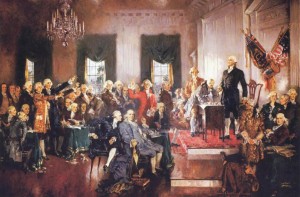Time to tread lightly. I don’t intend this post to be a diatribe against government welfare. Rather, I want to approach the subject Biblically, constitutionally, and practically. There’s an accusation floating around in the political arena that politically conservative Christians/Republicans-at-large [take your pick of descriptors] are uncaring individuals who don’t want to help those in poverty. Nothing could be further from the truth.
 From the Biblical angle, what can be said about our responsibility toward the poor? There is no question that God expects us to help those who are truly poor through no fault of their own. But a couple of caveats must be added: first, a distinction must be made between those in poverty who deserve to be helped and those who do not [the book of Proverbs is replete with examples]; second, none of the admonitions to help the poor are directed to civil government, but instead focus on individuals. No matter how hard you may look in Scripture, you will find no Biblical mandate for redistribution of wealth by civil government dictate.
From the Biblical angle, what can be said about our responsibility toward the poor? There is no question that God expects us to help those who are truly poor through no fault of their own. But a couple of caveats must be added: first, a distinction must be made between those in poverty who deserve to be helped and those who do not [the book of Proverbs is replete with examples]; second, none of the admonitions to help the poor are directed to civil government, but instead focus on individuals. No matter how hard you may look in Scripture, you will find no Biblical mandate for redistribution of wealth by civil government dictate.
God wants help for the poor to be a real help, not a fake solution that creates further problems. His goal is to work on the character of both the persons in poverty and the persons who come to their aid. He wants giving to be a highly personal type that engenders true compassion on the one side and a desire to be raised out of poverty on the other. No government system that depersonalizes aid can ever achieve those goals.
 Then there’s the constitutional issue. Where did the Founders give authority to turn the federal government into the great provider for the citizenry? Even as you cannot find a Biblical command for the government to be that provider, neither can you find a constitutional provision that grants such a power. Of course we do it all the time. Money to help the poor and/or the infirm and the aged has become the largest portion of the federal budget. Those who say we need to spend less on defense and put it toward the poor don’t realize that the percentage of our budget that goes to defense, even during the War on Terror, has continually decreased.
Then there’s the constitutional issue. Where did the Founders give authority to turn the federal government into the great provider for the citizenry? Even as you cannot find a Biblical command for the government to be that provider, neither can you find a constitutional provision that grants such a power. Of course we do it all the time. Money to help the poor and/or the infirm and the aged has become the largest portion of the federal budget. Those who say we need to spend less on defense and put it toward the poor don’t realize that the percentage of our budget that goes to defense, even during the War on Terror, has continually decreased.
What did the Founders believe about welfare? They relegated it back to private individuals, churches, other organizations apart from the government, and, as a last resort, to the local government. The only government that should ever be involved is the one closest to the need, so that it can be clearly analyzed to ensure that the need is genuine indeed. That goes back to the Biblical concept of distinguishing between those who should and should not be helped.
I’ve covered—in a cursory manner, to be sure—the Biblical and constitutional perspectives. It still remains to comment on the practical side. We’ve had a lot of time now to see how the federal welfare system has worked. Unbiased studies show it has not worked well at all. Those studies reveal a few key problems with the system: people develop an entitlement mentality that leads to resentment when they don’t receive what they believe they are “owed”; many are trapped in the welfare-recipient mode from one generation to the next; and there is no personal accountability or connection between the recipients and the nameless, faceless bureaucracy that hands out the checks.
That’s why both Republicans and Democrats, back in the mid-1990s, supported a welfare reform bill that sought to end welfare as a lifestyle. If we continue on the welfare-mentality path, we will become just like the European nations that are literally going up in flames right now. We have overspent and are on the verge of a financial meltdown. Cutting back is absolutely essential, and it can be done in such a way that we don’t throw people out on the streets or have them die from lack of support. And it’s really amazing what individuals can do if they are forced to take responsibility for their own well-being. If they don’t have to, they won’t. If they must, they can become quite entrepreneurial.
The conservative Christian/Republican model for helping the poor is to have a safety net at the local level along with empowering individuals, churches, and other organizations to step to the plate. The church as a whole must share some blame here when it concludes that since the government is “taking care of the poor,” the church doesn’t have to bother with it anymore.
The conservative Christian/Republican model also frees up the market to create prosperity and opportunity for all. The goal is to enable those who have become dependent on the government to enter the market themselves and succeed. One of the prerequisites for accomplishing this is to remove the impediments the government places on those who wish to start their own businesses or other creative endeavors. Some people think it is a cliché to declare that a rising tide lifts all boats, but it goes beyond any cliché—it is a reality.
 For those who say that this approach will still leave many poor, I can only comment that there will be poor people in every society regardless of the economic system.When Mary, the friend of Jesus, anointed him with a costly oil, Judas Iscariot [someone with rather bad judgment, wouldn’t you say?] objected that the expensive perfume should have been sold and the proceeds given to the poor. Interestingly, Jesus disagreed, and noted that there always would be poor people around to be helped. He didn’t have any naive notion that poverty would ever be eradicated on this earth. Only those who have unlimited faith in the power of government to solve all problems fantasize about that. Yet it certainly is a fantasy.
For those who say that this approach will still leave many poor, I can only comment that there will be poor people in every society regardless of the economic system.When Mary, the friend of Jesus, anointed him with a costly oil, Judas Iscariot [someone with rather bad judgment, wouldn’t you say?] objected that the expensive perfume should have been sold and the proceeds given to the poor. Interestingly, Jesus disagreed, and noted that there always would be poor people around to be helped. He didn’t have any naive notion that poverty would ever be eradicated on this earth. Only those who have unlimited faith in the power of government to solve all problems fantasize about that. Yet it certainly is a fantasy.
History has shown that the highest standard of living for the greatest number of people comes only from a society devoted to liberty. In such a society some do well, while others don’t. If someone is left behind because of fraud or other misdeeds, the government then has a proper role in prosecuting those who commit those misdeeds and compensating those who were unfairly hurt. But most failure stems from personal character flaws and/or mistakes in judgment. If people learn from their mistakes, they can try again and do better the next time.
History has also shown something else, if one is open to learning from history: the socialist worldview always—and I emphasize the word “always”—leads to economic collapse for the entire society in the end. Why follow that path when it so clearly violates the Biblical mandate, our constitutional authority, and the lessons learned from practice?
